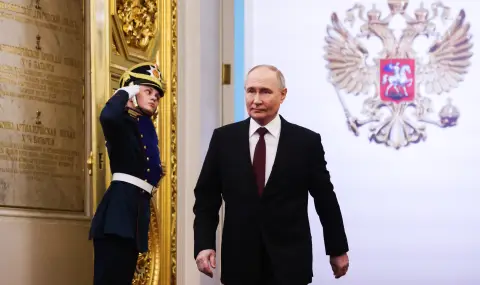In 2016, Russian President Vladimir Putin stated that Russia's borders do not end anywhere. However, the Ukrainian invasion of the Kursk region showed that it is not actually known where exactly the Russian borders begin.
Foreign Policy writes that the surprise offensive of the Ukrainian army in the Kursk region – the first invasion of Russia by a foreign army since World War II – has destroyed several myths diligently built by Putin over the past 20 years.
For two weeks now, soldiers of the “Nazi regime” in Kiev, as the Kremlin calls the authorities in Ukraine, are marching in the Kursk region, but the response of most Russians is a passive, even fatalistic shrug. The Ukrainian occupation of 1,000 square kilometers of sacred Russian land – which Putin's forces are still unable to reclaim – burst the numerous myths related to the power and inviolability of the Russian state.
The first bubble burst was related to long-running Russian propaganda about an alleged existential threat to the country coming from Ukraine. We don't see anything like that today – there is no mass public discontent, spontaneous formation of militias or long lines of volunteers in front of military recruitment offices (such as there were in Ukraine after the unprovoked full-scale Russian invasion in February 2022). There are no fiery speeches of Russians in defense of the fatherland, nor any patriotic slogans on the streets of Moscow. There is not even a general mobilization announced. Kremlin spokesman Dmitry Peskov did not even interrupt his vacation. Russian anger is directed at Moscow, not the “Nazis” from Kyiv. Kremlin-controlled sociologists register a sharp rise in dissatisfaction with the government, including among citizens evacuated from Kursk. Many of them are angry and feel abandoned by their own government. Much to the dismay of the patriotic Z-bloggers, no one in Kursk resisted, joined partisan groups, or even protested against the occupiers, as happened in countless places in Ukraine. Across Russia, mothers of conscripts are protesting their untrained sons being sent to active war zones.
And the rest of the Russian population doesn't seem to care at all if part of Russia is now occupied by a foreign army. Whether this is due to an instinct for self-preservation or a sense of helplessness... Even TV pundits supporting military aggression against Ukraine point out that Kiev can use occupied areas of Russia in a land-for-land trade - in other words, they correctly see the invasion as part of a strategy to drive Russia out of Ukraine, not as a threat to Russia itself.
The second myth busted has to do with Putin's image of an authoritarian leader built on strength, order and a promise to make Russia great again. His apparent inability to protect the country's borders makes Putin, who has tied his rule to rebuilding the lost Russian empire, look weak.
Putin has all but disappeared from public view as the Kremlin tries to downplay the invasion. The Russian president euphemistically called the invasion a “counter-terrorist situation”. Urging local authorities in Kursk to deal with “the situation”, Putin appeared eager to distance himself from the border chaos. On Russian state television, which of course is strictly controlled by the authorities in the Kremlin, there were even calls for the Russian border areas to be “sacrificed” in the war against Ukraine.
Third, by taking the war to Russian territory, Ukraine bursts the bubble for the Kremlin's threats to escalate the war, based on the idea that Russia's existence, not Ukraine's, is somehow at stake. The supposed threat from NATO is no longer a talking point. Russia has not called on its own defense alliance, the Collective Security Treaty Organization (CSTO), for help, as would be expected if its existence were threatened.
Today it turned out that it is not known where the Russian borders begin. Putin's nuclear threats turned out to be a bluff. Even the actual border of the Russian Federation is not a “red line” that should not be crossed. The Western theory that Putin's red lines should not be crossed for fear of escalation has turned out to be bogus. Will this be a lesson to the still hesitant Western countries that are not helping Kiev to their full potential for fear of escalation?
The Ukrainian invasion shattered the myth that Russians collectively support the war just because government-sponsored polls show it. Most seem to just take a cue from Putin: in case of a problem, just ignore them and hope it goes away on its own.
